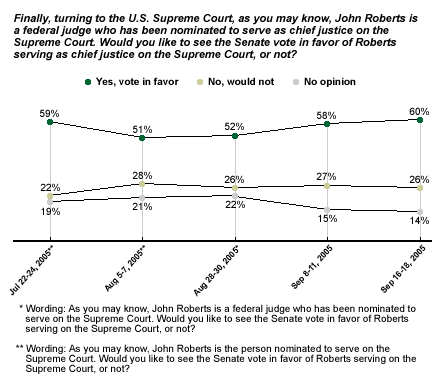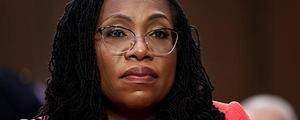Last week, the Senate Judiciary Committee approved John Roberts' nomination as the next Supreme Court chief justice, paving the way for the Senate to confirm him this week. A majority of Americans would view that outcome favorably; more than half have favored his confirmation since Gallup began asking about this in July.
Majority Continues to Favor Roberts
The most recent CNN/USA Today/Gallup poll* shows 60% of Americans would like to see the Senate vote in favor of Roberts, and roughly a quarter (26%) say they would not. Fourteen percent have no opinion on the matter. The percentage favoring his confirmation is similar to Gallup's initial polling about Roberts in July. Support for the Senate voting in favor of Roberts dipped slightly in August, but rebounded in the two polls conducted in September.

All Those in Favor
Some Americans -- specifically Republicans and white Americans -- are more likely to favor Roberts' confirmation.
Nominated by a Republican president, it's not surprising that Roberts' strongest support comes from the Republican Party. About 8 in 10 Republicans (82%) would like to see the Senate vote in Roberts' favor, compared with 60% of independents and 44% of Democrats. But Roberts' support among independents and Democrats is also slightly higher in the most recent poll than was found in the previous polls.
There's also a difference by race, although the difference is somewhat weak when political party affiliation is taken into account. Sixty-four percent of white Americans would prefer a vote in favor of Roberts, compared with 48% of nonwhites. This racial gap has been fairly consistent across all four polls.
*These results are based on telephone interviews with a randomly selected national sample of 818 adults, aged 18 and older, conducted Sept. 16-18, 2005. For results based on this sample, one can say with 95% confidence that the maximum error attributable to sampling and other random effects is ±4 percentage points. In addition to sampling error, question wording and practical difficulties in conducting surveys can introduce error or bias into the findings of public opinion polls.
